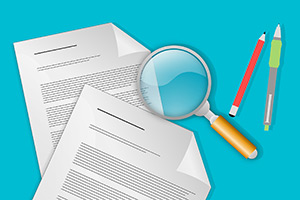My Comedy Career: Ariane Sherine
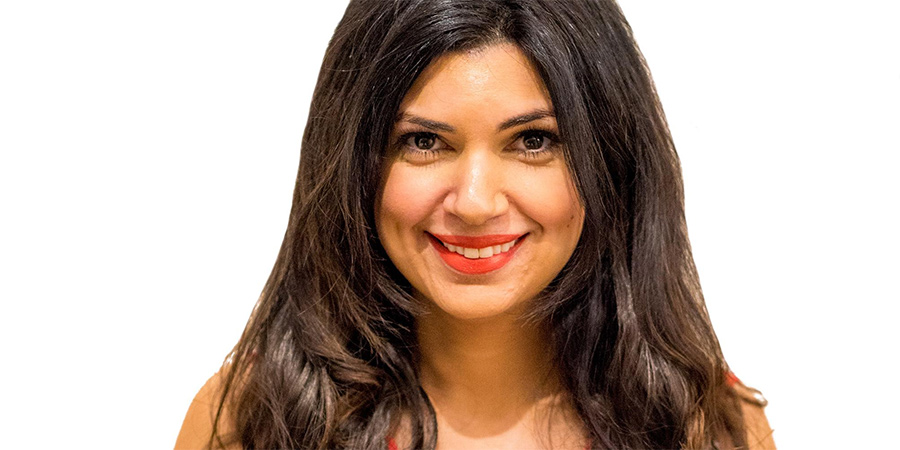
Ariane Sherine shares with us what she has learnt whilst working as a writer and podcaster. Her honest answers are very interesting to read.
Tell us what you do in your job.
I've spent nearly two decades working in comedy, since I was 21 (fuck, I'm old!).
For the first six years of my career (2002-2008) I wrote scripts and material for mostly BBC TV shows (My Family, Two Pints Of Lager And A Packet Of Crisps and The Story Of Tracy Beaker among many others), and I also wrote jokes, stories, poems and general opening material for Channel 4's Countdown. I also did lots of stand-up.
I then worked as a journalist for ten years (2008-2018) writing topical comedy for publications including The Guardian, The Sunday Times, The Spectator, The Independent, Esquire and The Daily Mash.
These days, I also write funny non-fiction books for the major publisher Hachette, the latest of which is a comedy-science book called How to Live to 100. And I've literally just put out my debut novel on Kindle, which is very exciting - it's called Shitcom and is a hilarious body swap comedy about what it's really like to be a TV sitcom writer for the BBC.
Comedy is wonderful when it's going right. It can also be an incredibly difficult and dispiriting industry for several reasons. People at the top mess about with your work all the time, sometimes in baffling and frustrating ways; you have to be nice to producers and script editors even when they upset you, because you need them to employ you; and producers in telly make you lie to the public about various things to do with shows (on one show I worked on, they held a premium line phone vote for viewers to decide on a plot point which had already been decided; on another, I wrote comedy letters which the viewers were told were sent in by audience members).
To give you an example of people messing with your work, I put the following joke in a script (names changed). The scene was between the main character Grace, who was pregnant, and her friend Jill, who was going to bring some kids on community service round to clean Grace's house. Grace's husband Jack was out of the house in this scene, and Grace said to Jill, 'I'm sorry about the sofa. Jack didn't mean it - he was drunk.'
And as the punchline, Jill says 'It's okay, I'll tell the kids it's chocolate mousse.'
It's not the best joke in the world, but it's perfectly serviceable. Anyhow, they changed Jill's punchline to:
'Errgh, do you mean Jack weed on the sofa?!'
I remember saying how unhappy I was with the substitute line. Thing is, as a 23-year-old jobbing comedy writer you can't make a massive fuss because you're totally expendable, so all that happened when I complained this wasn't a joke and I was embarrassed to have my name associated with it, was that they said 'Oh, okay, do you want us to take your name off the credits?'
And then, of course, you have to backtrack because you can't not have your credit, because then you don't get the show listed on your IMDb (which is what happened with my 200 episodes of Countdown, though I still have all the material I wrote and the contracts from Granada), and you can't put it on your CV (well, you can but people might not believe you when they Google to check).
And you also don't want to make a fuss because you're being paid £9,000 an episode and that means you don't have to work in a crappy soulless day job with David Brent as your boss. You're eager to stay in with producers and script editors, who also work on other shows, and you don't want to get known as a nightmare to work with.
So basically, unless you rise high enough and start creating your own shows, you end up agreeing to all kinds of terrible script ideas when you write for other people's shows, and it sucks.
But all that said, comedy writing is still a billion times better than the average day job.
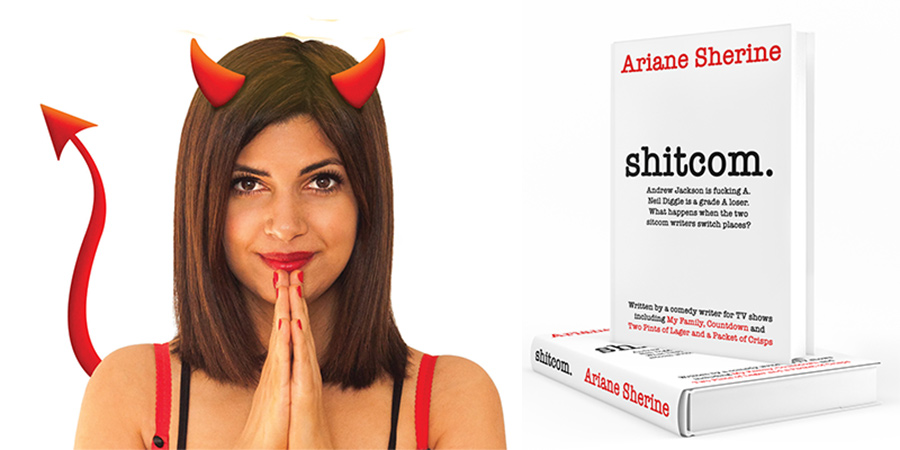
How did you first get involved in the comedy industry?
I was 21, just finishing studying music production at uni, and had no contacts or training. I entered the open-to-the-public BBC Talent New Sitcom Writers' Award 2002 with my very first sitcom script, and came joint runner-up. Because of this, I became eligible to apply for a Children's BBC Writers' Scheme, and my mentor was the executive producer of The Story Of Tracy Beaker, so I ended up writing an episode of that, which led to the gig on Two Pints.
What key skills do you need to be able to do your job well?
To be a comedy writer, the answer is that you need to be funny, but also very stoical as a lot of your jokes will get written out!
You also need to be placid and patient and not cry all over people's clothes when they're editing your writing.
You also need to meet deadlines, motivate yourself and follow direction. And it helps if you're likeable - I'm sure I was sacked from comedy writing gigs just for being too young and embarrassingly gauche.
What has been your biggest career achievement to date?
To be honest, my whole career has been a huge achievement, given that I grew up with a violent dad in a cold, loveless and abusive home and was severely bullied at school. I spent my teens anorexic, self-harming and suicidal and could have ended up on the streets on drink and drugs or worse, so I'm very grateful to be alive and to have done such exciting, fascinating and creative things for a living.
I feel very lucky these days because I now have the confidence and drive to work solely on my own projects.
I'm proud of Shitcom, which I wrote in 2004. I shelved it after I was attacked by my then-boyfriend while pregnant in 2005, and have just edited it into shape. The novel contains a lot of my experiences of being a sitcom writer, so was quite cathartic.
As well as writing, I also love designing graphics, editing and producing videos, writing songs and producing music, and will be releasing my debut album Better later this year.
And what has been the biggest challenge/disappointment?
Having a nervous breakdown when I was 29 derailed my next ten years.
As part of my columns for The Guardian, in 2008 I created an atheist advertising campaign called the Atheist Bus Campaign (where slogans ran on buses saying 'There's probably no God. Now stop worrying and enjoy your life'). The campaign raised £100,000 of public funding in its first four days of crowdfunding - it was hugely successful and went global, running in 13 countries around the world in 2009. Because it got so much international press coverage, I got a tonne of hate mail, including some death threats. I became severely anxious, spent more than a year barely leaving the house because I was convinced I was going to be killed, and didn't write for more than three years because I was too scared to do anything in public.
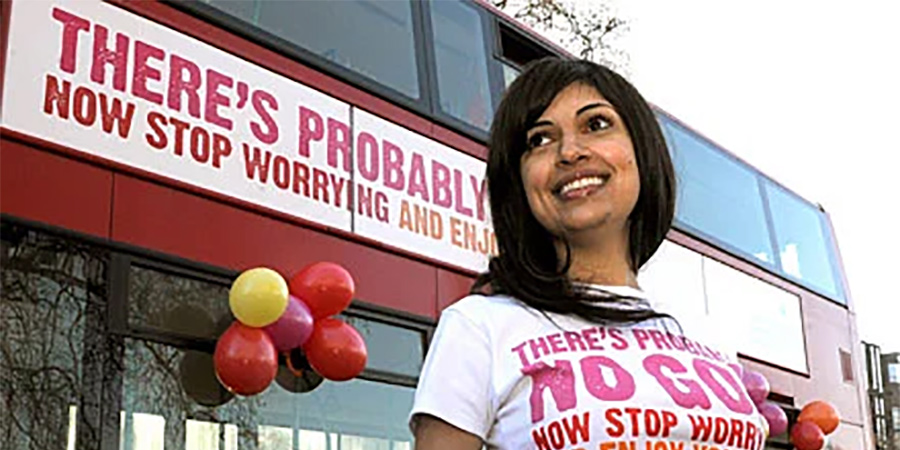
I managed to get on lifesaving medication including antipsychotics, but it took a long time for me to get properly better (I'm still on the meds and probably always will be). And during that time, I got pregnant, gave birth to my daughter and became a single mum. I was skint due to turning down all work during my breakdown, so couldn't afford childcare, and having a rambunctious toddler trashing the house wasn't really conducive to concentrating on work!
It was all very tough but I came through it - I'm now a workaholic with a ridiculously strong work ethic to try and make up the time I've lost. And my daughter's now ten, wonderful, kind and hilarious, and infinitely less distracting. In fact, right now she's reading comic fiction next to me as I type this!
Talk us through a typical day.
I've always thought that a good work-life balance doesn't really apply to creatives, partly because we're obsessive creatures and partly because you have to work harder and work longer hours as a trade-off for getting to do fun stuff. Plus it's not like most jobs - your work never stops! You can work in the middle of the night if you want to. I always have half a dozen projects on the go - right now I'm working on three books, two albums and a brand new podcast called Love Sex Intelligence.
I have four big rules for each day which don't involve work: I have to speak to or spend time with my daughter; exercise for an hour; eat at least 5-a-day (ideally 10); and meditate. As long as I do those four things, which all help my mental and physical health, I can go to sleep happy.
I make ridiculously detailed, itemised To Do lists, with each item tied to a particular time. I don't always follow them to the letter, but they give me a structured framework for the day, which I think is important when you work from home. I want to get as far away from the 'meander aimlessly around in pyjamas at 3pm with cornflakes stuck to my top' image of a writer as I can get!
I get up at 8am and get ready for the day. I exercise to get that out of the way (I really don't enjoy exercise so tend to put it off otherwise!), have a cup of green tea and meditate. I tweet an inspirational non-religious Thought For The Day daily at around 9am, and have eaten breakfast by 9.30am. Then work starts.
If it's a music day, I'll enter my home studio. I program songs in Logic Pro X which is Apple's audio editing software - it's why my pop star name is Ariane X. I lay down drum loops, chords, bass, hooks and weird electronic sounds, and simultaneously write the melody and lyrics.
If I'm editing podcasts, I sit like a zombie in front of my iMac for hours.
If it's a writing day, I'll write in bed with my laptop on my lap, which probably nukes my fanny, but hey-ho. I find I can concentrate for about an hour at a time, but then I need a short break before diving back in.
I sit still and stare at a screen all day which is super-unhealthy, but then welcome to the less active creative industries! I try to exercise and walk around for at least a minute each hour, prompted by my Apple Watch. I eat when I remember, because when you're in flow on a project you lose track of time.
After I have a rough edit of a song or a new chapter of a book I send it to my friends for their thoughts. If it's a song, I'll send the vocals to be autotuned and, later, all the tracks to be mixed and mastered. Making music is absolutely thrilling and exhilarating and I wish I'd done it 20 years ago. But hell, maybe I wouldn't be able to write such good lyrics without a 20-year writing career behind me? Who knows. The album's out at the end of this year, and I can't wait to watch it fly.
I never aim for a good work-life balance during the week. My work is my life and I live to work. That said, at weekends I mainly just spend time with my incredible daughter, because she's the absolute best thing in my life.
Tell us a trick/secret/resource that you use to make your job quicker/easier.
For writing: learn how to touch type. It was the most useful thing I ever learnt during my education. No, you can't 'type fast enough with just two fingers'. You don't want to be looking at the keys, you want your fingers to fly across them without you having to think about what you're typing.
For music: there are endless tricks in the music software I use, Logic Pro X, such as looping and quantizing, which mean you don't need to play the music perfectly and redo it if it's wrong - you can just fix it in a few seconds. Awesomely time-saving and a real perk of making music in 2021 instead of 2001.
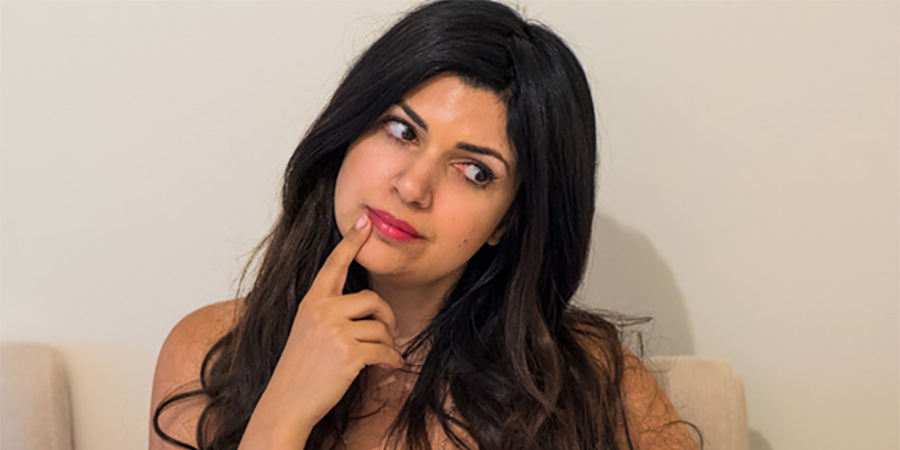
How are you paid?
I have a Patreon at www.patreon.com/lovesexypodcast on which I'm ridiculously open about my (currently non-existent) love life and creative projects. It nets me around £150 a month. If you'd sign up to it I would be so fucking grateful I'd probably cough up my hernia. You'd be joining such illustrious patrons as Charlie Brooker, so you'd be in good company. You get my weekly email, a photo and a free excerpt of my writing each week for $5 a month - and, at higher levels, a phone call with me, credits on my projects or a book character named after you.
Other than that, I got £2,600 for my last comedy book, Talk Yourself Better, and am getting £1,600 for my current one and the one after, as they're co-writes. I also occasionally get telly royalties through from ALCS and BBC Worldwide, telling me I've earned £3.38 from a broadcast of Two Pints in Lithuania.
Unsurprisingly with these numbers, which work out at around £400 a month, I'm on Universal Credit. But I'd rather be on UC and working full-time on my own creative projects than be well-off living someone else's vision. And when my pop career takes off I'll be ludicrously rich, so it will all have been worth it!
If you could change one thing about the comedy industry, what would it be?
Make it a meritocracy, hire people with genuine funny bones and base decisions on what's actually funny rather than what's politic. OK, that's three. Sorry. Maybe hire people who can count, too?
What tips would you give for anyone looking to work in your area of the industry?
My top tip is: enter competitions. I and pretty much everyone I used to work with got into the industry via a competition (Susan Nickson, Danny Peak, etc).
If there are no suitable competitions, look up who produces your favourite show and send them a spec script for it. They might just hire you, because they're often looking for writers. Then as soon as you get a credit for a show, or even just a commission, try and get an agent. They'll know of more opportunities than you will and will negotiate you better fees. (Of course, agents can also be a nightmare, but that's a whole other kettle of boiled haddock.)
Oh, and work hard. I work like a motherfucker. You're doing what you love, so why wouldn't you want to work all the time? Develop an incredible work ethic and put all your passion and soul into what you do. You'll get there - and if for some reason you don't, at least you'll be able to say you gave it all you got.
Shitcom by Ariane Sherine is now available to pre-order via Amazon at the eminently reasonable price of £1.99. Sign up to Ariane's Patreon. You can also follow her on Twitter and Instagram at @ArianeSherine.

